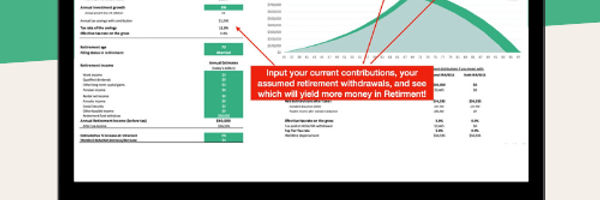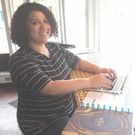As a young adult, it can be hard to gauge where you are financially and if you're on the right track. If you've asked "Where should I be financially at 23?", or any financial question in your early 20s, you aren't alone. Based on our experience and research, here's our take!
Keep reading below, but if you want to learn more about getting out of debt and investing, consider reading these posts as well:
How much money should the average 23-year-old have?
You may be surprised to know that there is no right or wrong answer to how much money you should have by 23. However, the average 23-year-old has a net worth of -$33,984 (that's negative $34k!), mostly due to student loans and a limited amount of savings.
So even if you're in the negative, you're not alone. But we'll talk about how you can increase your savings and net worth as a 23 year old, even with a reduced salary or debt.
Where should I be financially at 22?
Covering a few different, but similar ages here...
Most financial planners recommend having at least three to six months' of your salary saved in an emergency fund. And, they also recommend being able to put 15% of your monthly pay into a retirement fund. However, many people in their early 20s may not be able to meet these recommendations, and that's okay.
If anything, start small. Try to get your emergency fund to at least $1,000. After that, you can slowly build it up.
Where should I be financially at 26?
By 26, you may be finally in a stable work position, and have a (hopefully) decent salary. ie. acareerjob that likely earns $50k or more a year.
Your net worth should also be zero or greater (vs. negative when you graduated from college). So now is the time to focus on saving more money and taking your investing seriously.
If you've started building a family, that may take priority over saving for retirement. But still, you need to be able to put money away for a rainy day. While putting retirement on the back burner isn't always recommended, savings is better in case you need money right away.
How much do most 23-year-olds have in savings?
If you're asking, "Where should I be financially at 23?", you might be asking about your savings amount.
How do you compare to others when it comes to savings?
Currently, there aren't any confirmed numbers for Gen Z and how much they're saving on average. But, it has been reported that around 70% of Gen Z-ers are saving and investing for retirement.
How much do 23-year-olds make?
What about the salary of a 23 year old? How much should you be making at age 23?
The median salary of 20 to 24-year-olds is about $667 per week. Based on that number, it's safe to say most people this age make around $35,000 per year.
How much money should I have saved before moving out?
It can be expensive to move out, especially with everything you need to pay for when it comes to a new place.
Deposit,
pet deposit,
new items,
and even first and last month's rent are usually required.
But there are often other fees too, like utility connections, first month's bills, and more. Before moving out, focus on how much you may need.
Look at apartments and houses in your local area. Think about whether or not you'll need or be able to get a roommate. And of course, figure out the average price for bills and "hidden" costs that you may have to pay.
From there, you can calculate a more specific number. But we recommend around $2,000 to $2,500 saved before moving out.
Read more:
How to save money in your 20s
So how can you save up the money before you move out? How can you amass that $2,000-$2,500?
Here are some fantastic ways to save money in your 20s:
Sell some stuff (old games, gift cards, clothes, college textbooks)
Get a side hustle (make stuff and sell it, mow some lawns, become a tutor, anything!)
Commit to only doing free stuff for entertainment! (go to the park, hang out at a friend's place, find free activities in your local city on the weekends)
Start putting some money aside. The best way to keep track of it, is to use a simple spreadsheet. You can either create one yourself, or use our 50/30/20 template 👇

50/30/20 budget template perfect for beginners!
A few key features of this template:
Only includes the things you need – no unnecessary tabs
Included clear instructions
Pre-filled with sample data
Fully customizable to your needs

How can I be financially stable in my 20s?
In order to be financially stable in your 20s, there are a few things to focus on...
start paying off debt,
and start saving.
It really is that simple! Learning these three simple budget "rules" can help you be more financially stable in your 20s, and beyond.
But where should you save your money? Check out America's saving habits to see where NOT to keep your money!
What is the 50/20/30 budget rule?
For those who aren't used to budgeting, or if it seems to hard to do on a smaller salary, try the 50/20/30 budget rule. It's one of the easiest budgeting systems out there, and simple to start.
First, you'll use 50% of your income on your living expenses. This includes rent, car payments, insurance, etc.
Then, 30% is focused on spending, just for you! This could mean treating yourself, groceries, whatever you need to "spend" money on.
The other 20% is for savings, or for debt if you're still focused on paying that off. You can also split the 20% in half and put 10% towards savings and 10% towards debt payments.
It all depends on your financial needs. This keeps budgeting simple and helps you understand where your money is going, without the constant tracking.

50/30/20 budget template perfect for beginners!
A few key features of this template:
Only includes the things you need – no unnecessary tabs
Included clear instructions
Pre-filled with sample data
Fully customizable to your needs

What should a 23 year old invest in?
When you're young like this, keep investing simple. You likely don't have the knowledge to invest yet, and if you truly don't know about something, we advise that you not invest your money in it.
So what should you invest in at age 23?
First of all, invest in yourself. If you're not yet through college and aspire to finish, save up cash to do that. No need to invest yet.
Second, invest in the stock market the simplest way possible - a great option is through an S&P 500 Index Fund like VOO. But, if you're not comfortable with that yet, then don't do that either!
Read more:
How can I build my wealth at 23?
Now that you know that you're not behind, and that most 23-year-olds are in the same position as you and figuring things out, let's talk about how you can start building wealth at 23.
Live Simply
First, it's important to live below your means, especially when you're younger. Now is the only time in your life that you won't have many responsibilities.
You (most likely) don't have kids, expensive bills, and you're young enough to have cheaper insurance rates and costs associated with health care and old age.
But, it's easy to start living right at or above your means. This is called lifestyle inflation, and usually happens it when you get a higher paying job, promotion, or even pay off significant debt.
Instead, focus on living simply and below your means
Find a cheaper apartment, or live with family/friends if you can to cut costs!
Buy cheaper groceries that still give you the nutrition you need.
Don't shop unnecessarily.
Cutting costs can help you put more money into savings, pay off debt, and take advantage of investing early.
Read more:
Start Small
Next up, start your wealth building journey slowly. There is no shame in starting small.
First, focus on saving up a small emergency fund.
Then, you can focus on paying off debt and investing in the future. Even if it's just $10 for each per paycheck, that's better than nothing at all.
If you want to invest your change or start with smaller amounts, apps like Acorns or M1 Finance can be great options.
Read more:
Invest In Your 401k
If you start a new job that offers of 401k, take advantage of it! Even if your company doesn't offer a match, you'll earn interest on the money you invest, which is essentially free money towards your future retirement.
And, if your company does offer a match, even better! Be sure to talk to them about qualifications and stipulations, but otherwise, invest as much as you can.

Roth IRA or 401k? This template will answer your questions.
With this template, you will get:
All DFY, simply add your details
Charts for comparison and clear answer
Easily update for any year (2023, 2024, 2025, etc…)

Increase Your Income
You can only cut back so much. When you're young, it's easy to get wrapped up in low-paying jobs because of lack of experience or education.
But at some point, you have to work at increasing your income. It's easier to save and invest when you have the money to do so.
This can be by getting a new and better paying job, starting a business, or side hustling,
You could also try to get a promotion or raise at your current job, although this may not always be the highest money maker. But if you like your job, there is no harm in trying!
When you do increase your income, be sure not to increase your lifestyle too. Focus living below your means and using the extra money to pay off debt, save, and invest as you see fit.
Get A Robo-Advisor If It Suits You
It's easier to save and invest money when you can set it and forget it. And you don't need to pay a financial advisor to be able to invest your money.
Instead, look into a robo-advisor. Sites like Betterment help you invest in your goals and retirement based on when you want to reach them.
From there, you can set aside money every time you get paid, weekly, monthly, or at any other interval of your choosing. That way, you can save without even thinking about it!
Read more:
Where should I be financially at 23? You have time!
So what's the verdict? Where should you be financially at 23?
As you can see, you are not behind or in a bad position if you're 23 and don't have much in savings or investment accounts. In fact, you're right where everyone else your age is too, figuring it out!
No more "Where should I be financially at 23?"!
Instead, take some time to set up your budget and goals so you can build wealth — even at a young age.
What are your aspirations for the future? Tell us in the comments below! We love hearing from our readers!




.jpg)



.jpg)
.jpg)


